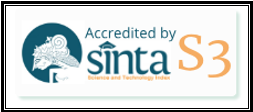Ethical Clearance
Because the research involves human subjects, every article submitted to the Academic Journal of Psychology and Counseling must meet the ethical clearance requirements, including:
- Ethical approval for all research
- Protection of participants
- Informed consent
- No coercion
- The right to withdraw.
- Anonymity and confidentiality
- Appropriate exclusion criteria.
- Concern about participan’s health and well-being.
- Duty of care.
- Additional safeguards for research with vulnerable populations
- Ethical treatment of non-human animals.
- Appropriate supervision.
Further explanation regarding this can be accessed at the following link. Ethical clearance form can be downloaded at the following link.
Exception
The exception to the obligation to include ethical clearance is research involving low and negligible risk. The definition of low and negligible risk (LNR) is as follows:
- Low Risk: A project in which the only foreseeable risk is one of discomfort. If there is any chance that the research may result in anything more serious than discomfort, the research cannot be called low risk.
- Negligible Risk: A project in which there is no foreseeable risk of discomfort or harm and if there is any foreseeable risk, it will not be of more than an inconvenience. If there is any chance, no matter how small, that the risk will exceed inconvenience, then the research cannot be classified as being of negligible risk.
(Source: "Low and negligible risk reviews")
For research involving LNR, although the author is not required by this journal to include ethical approval from an ethical committee or institutional review board, the authors must submit a signed checklist that proves that their research is indeed in the LNR category. An example of checklists, please click here.
Authors from Indonesia can get ethical clearance from the National Research and Innovation Agency (Badan Riset dan Inovasi Nasional - BRIN) through https://klirensetik.brin.go.id/prosedur, or other authoritative bodies, before doing their studies.










